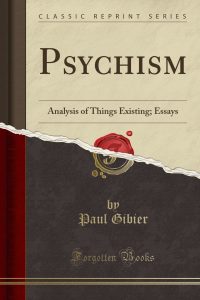Psychism, Analysis of Things Existing; Essays

Psychism, Analysis of Things Existing; Essays, by Paul Gibier, MD, is published by ForgottenBooks.com. Forgotten Books, from the London-based publisher, Dalton House, “…utilizes the latest technology to regenerate facsimiles of historically important writings.” The books can be read on-line, downloaded as a PDF, or purchased in print. Psychism was originally published in the third edition in 1899 by the Bulletin Publishing Company, New York.
Paul Gibier (1851-1900) was a French doctor and bacteriologist who founded and became the Director of the New York Pasteur Institute. He was an active member of the Society for Psychical Research in London and gradually became known for studies and experimentations in the areas of psychic phenomena, subjects that he approaches with youthful enthusiasm and unbounded energy. “We must acknowledge that to the author has been given privileges granted to few men, but it is because having once been awakened by a most simple fact, he became eager to know and found time to seek those things which he has seen.” Criticized by many scientists and physicians of his day – including his teacher, Louis Pasteur (1822-1895) – he argues brilliantly and tirelessly in his book for increased understanding of psychism, e.g., telepathy, lucid somnambulism, clairvoyance, clairaudience and spiritualistic phenomena, because these things exist. Regarding the numerous naysayers, he writes that such subjects “do not appear to have attained the required degree of respectability for their introduction to the scientific societies and journals where the gentlemen alluded to exercise their pontifical functions.”
The book consists of four Parts divided into Chapters. Part III is the longest, with seven Chapters extending from pages 79 to 261. The title would be better without the addition of Essays, which according to the dictionary usually deals with subjects from a limited or personal point of view. The topics in this book are in no way limited in scope, and very little that is personal is given by the author, except for his vehement defense of psychism throughout, as well as through the work of the Society for Psychical Research.
To list some of the subjects that are delineated in summaries at the head of each chapter or are included in the chapters: the macrocosm and microcosm, the materialization of matter, the night of Brahma, the rapidity of the nervous current through the nerves, the causes which operate to breed disagreement among philosophers; the Procustean bed of ideas and facts; the Egyptian, Chaldean and Hindoo schools from which their inspiration was gathered by Pythagoras; the Neo-Platonicians, the Kabbalists, the Theosophists and the “spirits” of modern spiritualists; Pythagoras on the recollection of anterior lives; the facts which show that the mind may receive communications from other sources than the ordinary ones of the organs, etc.
The book is unfortunately missing a thorough index, although a Table of Contents at the end of the book lists again the Summaries of all the Parts and Chapters.
After the long historic, scholastic and richly informational chapters of the book, Dr. Gibier begins to describe the personal spiritual experiences of others in Chapter III of Part III, titled A Study of the Psychical Constitution of Man. He progresses from haunting dreams of warnings, through the results obtained from hypnotism and suggestion (“…no subject will ever be placed under its influence without a preliminary conscious permission”) to mediumistic conveyances and “speaking ecstasy.” In Chapter VI of the lengthy Part III he finally arrives at a very critical and important junction in the book with his confession of terrifying and devastating experiences that occurred while he and others were conducting experiments with séances or “phenomenal psychism” in (unfortunately) an old anatomy lab in Paris in 1886. “We confess that our studies in this branch were followed with the customary fearlessness attributed to youth.” There follows a real life horror story, in graphic detail, that could well have led to serious illness or the death of the medium.
What Paul Gibier conveys about Louis Pasteur’s responses to the subject of psychism is one of the treasures of the book. From page 222:
“Our lamented teacher, Louis Pasteur, to whom we presented, in July, 1889, a new edition of one of our books on matters psychic, looked at us half reproachfully, and said: ‘How dare you meddle with a subject so dreamy, misty and intangible, wherein human reason finds nothing to grasp and is lost, when it is already so difficult to make more than groping paces on the grounds of investigation where we deal with objective matters falling under the control of our senses?’
‘Dear respected professor,’ we responded, ‘we can affirm to you that the matter on which this book treats may be placed under the ‘control of our senses’ as easily as are the erstwhile invisible microbes which, for the great benefit of mankind, you have been so fortunate as to ably reduce at command.’
“His intelligent face, at this assertion, became stern and thoughtful, and he appeared surprised. He remained silent for a while, then promised us to peruse our work. We have the impression that, while we write these lines, his spirit hovers over us and speaks approval of the work we are now preparing. Of the book we offered him, alas, he never spoke, for the Angel of Death had touched his brow!”
According to Wikipedia, Dr. Paul Gibier was killed in an accident with a runaway carriage in June 1900.
Paul Gibier on Wikipedia: https://en.wikipedia.org/wiki/Paul_Gibier
Louis Pasteur on Wikipedia: https://en.wikipedia.org/wiki/Louis_Pasteur
See Rudolf Steiner’s Lectures on True and False Paths in Spiritual Investigation – https://wn.rudolfsteinerelib.org/Lectures/GA243/English/RSP1985/TrFa85_index.html
Psychism, Analysis of Things Existing; Essays is available as a Forgotten Books publication on Amazon.com.